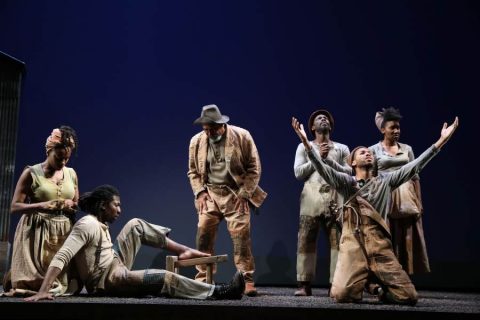

Suzan-Lori Parks, one of the most original and creative voices in American theatre, likes to think big. Her latest work, Father Comes Home from the Wars, Parts I, II, and III, the first part of a proposed trilogy, proves to be a mesmerizing, provocative theatre experience, bathed in Parks' rich, Shakespearean language, striking imagery, and framed by the blues. Once again, Ms. Parks proves herself to be the most creative and vital American playwright of the past three decades. As a theatrical examination of self, freedom, nation, community and war, Father Comes Home from the Wars demands to be seen, not just for what it says about the cataclysm known as the Civil War, which ripped the US apart over 150 years ago, but also what this play has to say about the state of relations today between peoples of different color.
Parks dives into antiquity to give Father Comes Home from the Wars not just the structure of tragedy, but also to give the play a mythopoetic resonance. Incorporating characters, plot elements and themes from Homer's The Odyssey, she follows the hero's journey to war, and back home - literally, as we watch Parks' protagonist Hero (James Udom) go to fight on the side of the South, in service of his master The Colonel (Dian Hiatt). The Colonel confronts Hero with a stark choice: stay on the plantation as a slave, or serve The Colonel in the Confederate Army, with the prospect of winning his freedom once the conflict has ended. Consequently, freedom and fidelity figure as central tropes in Father Comes Home from the Wars. Paralleling The Odyssey, the play has a partner who stays behind (Penny, Parks' doppelganger for Penelope) who fends off male suitors, more or less. When Hero does return, a kind of return of the Prodigal Son with his new wife not far behind, Penny, deeply wounded, welcomes him home anyway, and promises to ready the marital bed, echoing Clytemnestra's murderous welcome home of Agamemnon in Aeschylus' Agamemnon. But this tragedy, while ending in bloodshed, differs both in style and spirit from the Greek world, by giving a sense of hope and freedom to the oppressed, especially those who suffered the triple subjugation of being slaves, black and women.
Parks' long-time director Liz Diamond helms the production, which premiered at the Public Theater in October 2014, and Diamond knows how to let Parks' rich language speak for itself. The scenic design, by Riccardo Hernádez makes great use of the verticality of the Geary Theatre's stage, especially the striking set in Part ll, with series of four girders, some at oblique angles, lie down on, or jut out of a rocky slope of earth, with a sky behind that alternates between cerulean and an angry, mottled grey, with cannon fire bursting in the background. It's post-apocalyptic vision of the desolation of war, and of the human spirit, as Hero engages in emotional debates on agency, freedom, and identity with Smith, a Union Army captive (Tom Pecinka) as well with The Colonel. The first act plays out on the Geary Theatre forestage, the battle scene behind covered by a stage curtain, with only a tin shanty as a home for the slaves, including Eboni Flowers as Penny, Julian Martinez as Homer—Hero's rival for Penny who also has some deep issues with the protagonist—Rotimi Agbabiaka, Chivas Michael, Safiya Fredericks, and Steven Anthony Jones. The slaves often function as a kind of Greek chorus, stepping aside to comment on the action. And Gregory Wallace, in a brilliant twist on the role of "the messenger" in Greek tragedy as a character who delivers essential information, has a turn as Hero's faithful dog Odysseus, returned before his master in Part lll. Wallace's spin as man's faithful servant, simple, loyal and intuitive, contrasts with Hero's less-than loyal behavior, actions which produce significant costs.
This is theatre at its most essential, with Parks' rich streams of language—poetic, metaphorical, rhythmic—sounding both contemporary, yet also not out of place in the nineteenth century. And by showing the immense and profound suppression of (and hatred of) black Americans both then, and now, Parks links the past to the present, begging us to ask ourselves what progress has been made. Is freedom any closer? How much longer must people wait? Father Comes Home from the Wars provides some answers, while leaving much open for interpretation. But a future that promises two more installments of this trilogy indeed is a theatrical future worth waiting for.
At the Geary Theatre through May 20.